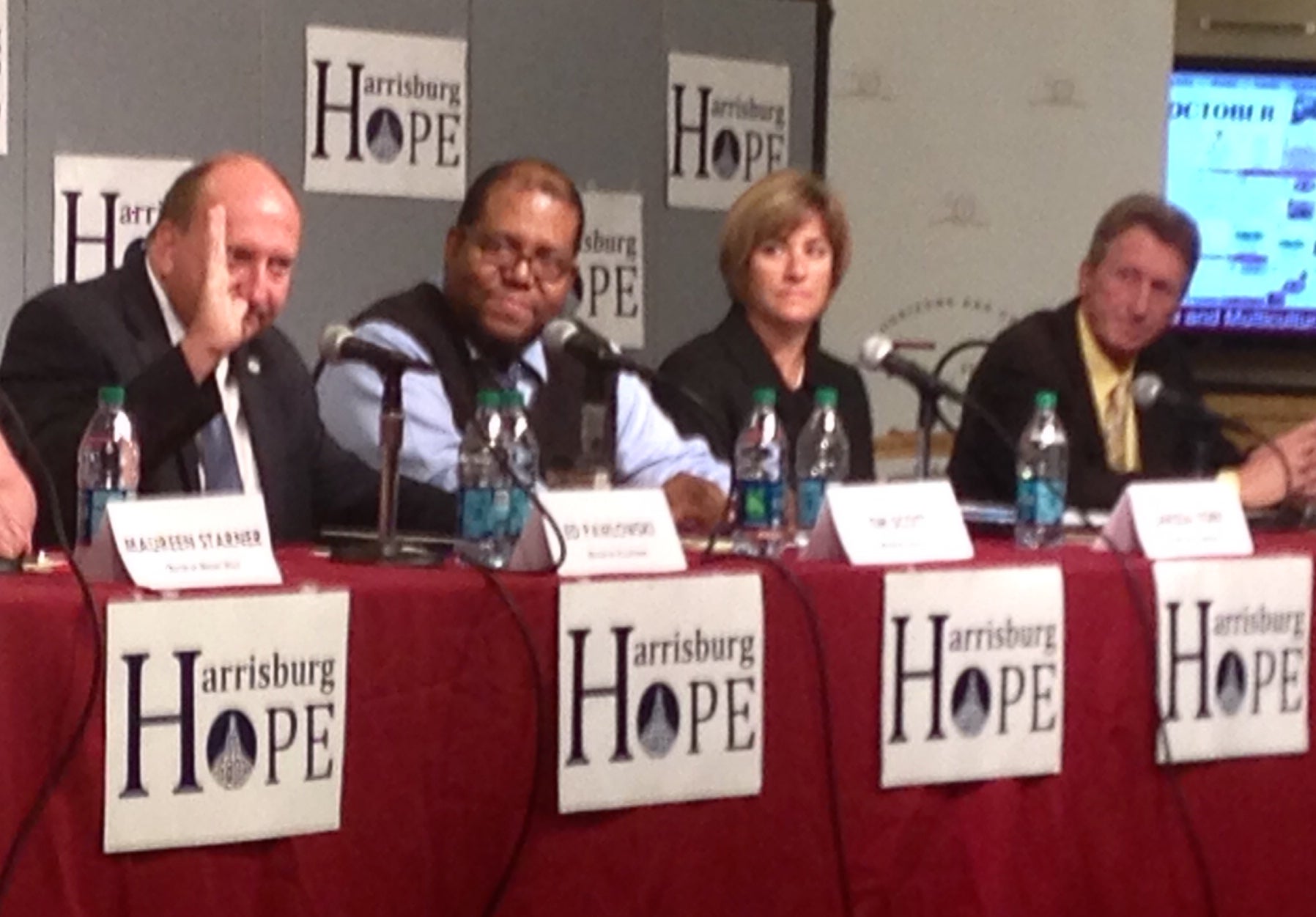Pennsylvania mayors say creativity is key to solving most pressing local problems

Allentown Mayor Ed Pawlowski, Carlisle Mayor Tim Scott, Lemoyne Mayor Larissa York and Highspire Mayor John Hoerner at Harrisburg Hope's mayoral summit. (Emily Previti/WIFT)
Mayors representing seven Pennsylvania municipalities in six counties attended the event at Harrisburg-Area Community College.
Allentown Mayor Ed Pawlowski might have said it best:
“It’s frustrating, because I have no control.”
Pawlowski was talking about public education, which came up repeatedly during a mayoral summit in the Commonwealth’s capital. But he could have been talking about pretty much any other topic mentioned during the 90-minute session at Harrisburg-Area Community College.
Pawlowski and his counterparts say state laws almost always worsen their most pressing problems and complicate potential solutions. So they’re figuring out their own fixes, even as they keep demanding action by state legislators.
Such complicated tasks, as state Auditor General Eugene DePasquale put it during his opening remarks, leave no room for party politics. “That’s not the point. When you’re a mayor, it really doesn’t matter,” DePasquale said. “Mayors are where the rubber hits the road. There is no ideological way to make sure the … snow is plowed, or the trash gets picked up.”
Common threads
Seven towns spread over six Pennsylvania counties were represented at the event, one of dozens of forums sponsored in recent years by grassroots group Harrisburg Hope.
Allentown, Lemoyne, Highspire, Penbrook, Carlisle, Mount Wolf and Newport’s mayors attended. (Harrisburg Mayor Eric Papenfuse declined his invitation to the event due to a personal conflict his spokeswoman declined to detail; however, Papenfuse ended up attending a financie committee meeting that evening with other city officials. Frequently applauded for its downtown revitalization and progressive policies, Lancaster’s Mayor Rick Gray canceled).
The municipalities are diverse. Urban, suburban, land-locked, river-fronted. Populations between 1,300 (Mount Wolf) and 80,000 (Allentown) – some growing, others declining.
The common threads among local leaders? They share similar frustrations with local pension and general debt obligations, binding arbitration guidelines, growing labor costs, unfunded mandates like those for sewage treatments systems, regionalization attempts, and revenue constraints such as nonprofit tax exemption.
They also say those issues often are worsened – and their potential solutions complicated – by the Commonwealth’s legislature failing to change the state laws. It’s unlikely locally-generated fixes will be the same among these communities. But it’s they’ll need to be creative, and capable of withstanding some controversy.
Creative fixes
Allentown and Harrisburg both unloaded high-profile public asset sales that garnered criticism despite their success in paying down pension and general debt obligations. The transactions were part of a multi-pronged, state-assisted stabilization attempt in each municipality.
Then there’s Highspire Mayor John Hoerner, one of 13 people pushing to send 200 borough students to Middletown for high school instead of long-struggling Steelton. That could take a couple of years, and would require the state Department of Equation’s approval over the objections of Middletown school officials.
“We cannot keep taxing our residents to sustain a school that’s failing in education,” Hoerner said.
And Carlisle voters will decide next spring whether to adopt a home rule charter. Mayor Tim Scott says the change will loosen some restrictions on local taxing power.
Scott’s also pleased with results from the borough’s “road diet” and cheaper, better emergency dispatch service since merging with the Cumberland County system.
But he cautioned his fellow leaders:
“It’s not a one-size-fits all for every community.”
Maybe not.
But the take away is that Pennsylvania’s local leaders are finding they need to put forth more effort and creative thought than ever before to improve – or even, to survive.
Editor’s note: This story has been updated to reflect Harrisburg Mayor Eric Papenfuse’s whereabouts Monday night.
WHYY is your source for fact-based, in-depth journalism and information. As a nonprofit organization, we rely on financial support from readers like you. Please give today.



